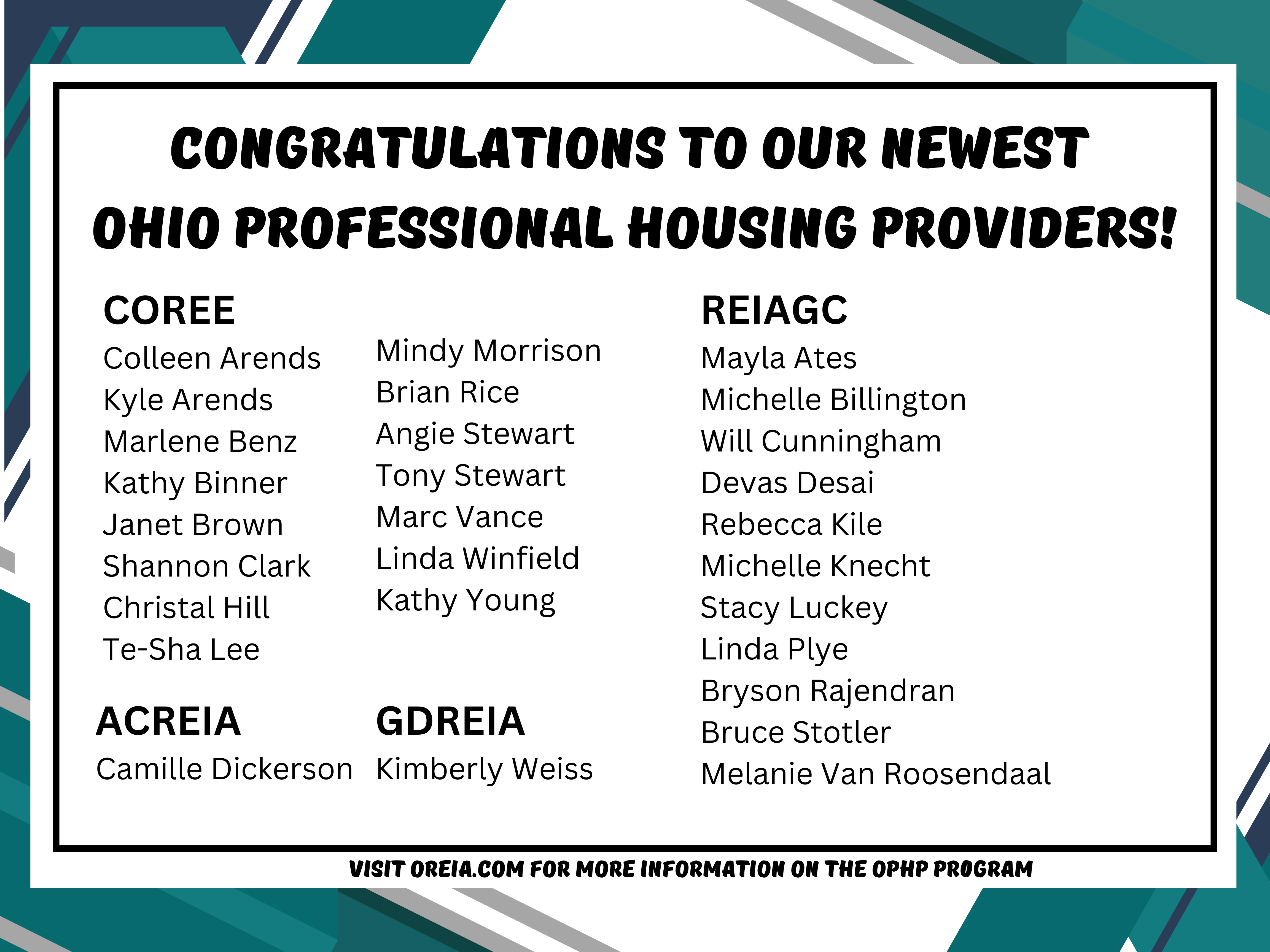Ohio Professional Housing Provider (O.P.H.P.)
What is the OPHP designation? The OPHP designation is a statewide, education-based certification program designed to recognize the high level of knowledge and professionalism among the designation holder. It is sponsored and overseen by the Ohio Real Estate Investor’s Association (OREIA).
Why obtain the OPHP designation? Only persons completing the educational requirements will be permitted to hold themselves out to the public as an Ohio Professional Housing Provider. The designee will be recognized in the form of an award certificate and the right to use the designation, and should recognize that having a basic education in the topics outlined below will increase his or her ability to reach his goals in real estate investment. Further, as OREIA works to make the OPHP designation more recognizable, it is hoped that the OPHP holders will have an advantage in dealing with legal and governmental bodies when a “my word against his” situation occurs. It will also aid in encouraging legislators to think of educated investors as a larger group for political action. Other tangible benefits, including discounts on courses and educational materials, may be added as the program develops.
2025 OPHP Graduates

Course of study. The course of study will be divided into 42 clock hours of core courses and 18 hours of elective topics for a total of 60 hours of formal education. The core topics are as follows:
| Appraisal |
2 Hours |
Including formal appraisal methods (cost, income, and replacement), Haines instruction and demos, how to compare properties, etc. |
| Contract Law |
3 Hours |
Including basic contract law; using contracts and clauses to protect yourself, developing contracts such as leases, options, purchase contracts etc., for the real estate investment business. |
| Ethics |
1 Hour |
Including ethics in financing, negotiations, etc. |
| Exit Strategies |
2 Hours |
Including discussions regarding wholesaling, retailing, lease/options, renting, selling with owner financing, etc. |
| Fair housing law |
3 Hours |
Including federal, state, and local fair housing regulations |
| Finance |
6 Hours |
Including conventional financing, FHA/VA financing, owner financing of all types; comparing, financing, offering financing. |
| Inspections |
2 Hours |
Including pre- and post- purchase inspections; move-in and move-out inspections. |
| Insurance |
2 Hours |
Including what type of property insurance is appropriate for investment property; negotiating for the best rates and coverage; renter’s insurance, worker’s compensation, liability insurance, etc. |
| Landlord-Tenant law |
2 Hours |
Including responsibilities of landlords and tenants, evictions, etc. |
| Management |
4 Hours |
Including record keeping; dealing with tenants; maximizing cash flow; etc. |
| Marketing |
2 Hours |
Including how to market properties for sale and for rent; how to market to prospective sellers. |
| Negotiation |
3 Hours |
Including negotiating with sellers, buyers, renters, contractors, vendors, banks, etc. |
| Purchasing |
2 Hours |
Including finding deals and calculating profitability. |
Rehab, classroom
Rehab, Hands-on |
1 Hour
1 Hour |
Rehab Classroom (1 hour): Including estimating rehab costs, which projects will pay for themselves, etc.
Rehab Hands-on (1 hour): Including actual hands-on opportunities and demonstrations, volunteer work for organizations such as, Habitat for Humanity, and rehab property tours. |
Regulations, Local
Regulations, Federal |
2 Hours
2 Hours |
LOCAL (2 hour): Including zoning and building codes, foreclosure laws, etc. Attendance at meetings of the city council or other political for the purpose of learning, testifying, objecting to new or existing local laws can be counted.
FEDERAL (2 hours) Including regulations affecting real estate investment OTHER THAN tax laws and fair housing laws, such as; lead paint regulations, wetlands regulations, underground storage tank regulations, Environmental Quality Zone regulations, etc. |
| Tax law |
2 Hours |
Including calculating and minimizing taxes, and tax laws as they affect the real estate investor, 1031 exchanges, property taxes. |
The remaining 18 hours may include further education in any or all of the above topics, as selected by the OPHP candidate.
How will I obtain these hours? These hours may be obtained by attending meetings, seminars, and events of their local association or those of any OREIA member group. Credits will be recognized only for events that have been assigned OPHP credits by the local OPHP Liaison or the OREIA OPHP Committee. ALL OUTSIDE COURSES- must (1) Be Pre-approved by the OREIA OPHP Committee. (2) Be taught live, including via webinar where attendance can be verified by an attendance log. (3) The presenter must provide a certificate of attendance acceptable to the OPHP Committee.
Continuing education to maintain OPHP designation. Once the OPHP designation has been obtained, designees must complete 20 hours of continuing education every two years in order to maintain the designation. These hours are elective and may be used by the designee to continue his or her education as he sees fit. Members dues must be current to renew and maintain their designation.
Goals of OREIA. The Ohio Real Estate Investor’s Association is dedicated to making this program a success. It is understood by the committee that the program will evolve as time goes on, and that time will pass before the local groups, their members, and the public at large recognize the value of this education. OREIA believes that the concept of creating well educated investors is important in the fight to make our industry a respected one. We also believe that the ability to present our members as dedicated, educated professionals will aid in the political action to which we are dedicated. While this education is already the mission of the local associations, we hope that a statewide designation will further this goal by making legislators, regulators, and the public at large recognize that we are not simply “landlords”, but informed business persons who make an ongoing contribution to our communities.
“The OPHP designation is even more important than ever…” Deb McMillan, OREIA Past President